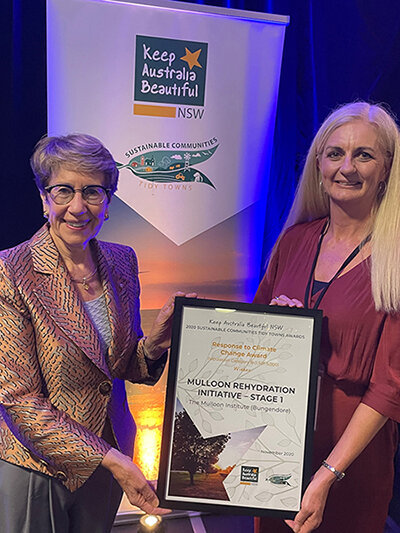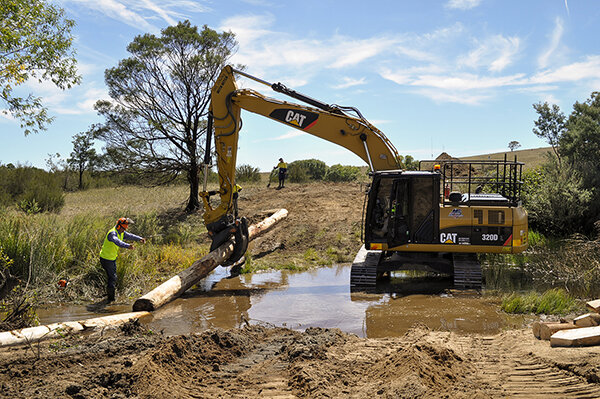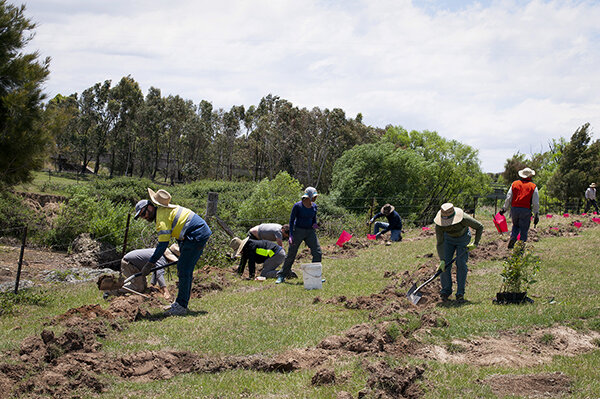MEDIA RELEASE – 18 March 2021
An ambitious project by the Mulloon Institute to rehydrate the landscape, capture carbon in the process and cool the earth has won the ‘Response to Climate Change’ award at the 2020 Australian Sustainable Communities Awards.
The ‘Mulloon Creek Rehydration Initiative – Stage 1’ project is one element of the much larger catchment scale project, which is unique in Australia, not only because it has 20 farmers working together across 20,000 hectares committed to restoring natural landscape function but because of the detailed level of scientific monitoring associated with it. Stage 1 involves 1,000 hectares and three properties.
Her Excellency the Honourable Margaret Beazley AC QC, Governor of NSW with The Mulloon Institute’s CEO Carolyn Hall. Photo: Trevor Hicks
CEO of the Mulloon Institute, Carolyn Hall said:
“At a time when the world is looking for solutions to reduce the impact of climate change, specifically global warming, this Award is a great recognition of the important role Agriculture can play, while working in unison with nature, to move the sector from a net emitter of carbon dioxide to a sequester of carbon.”
“Soil can hold three times the amount of carbon than is currently in the atmosphere. Our work in rehydrating the land puts more water into the soil, which improves carbon levels and helps grow more vegetation.”
“This in turn increases transpiration which reduces heat levels in the atmosphere. At a local catchment level, it helps farmers become more resilient to drought, fire and flood”.
The Institute’s work has also been acknowledged by the United Nations Sustainable Development Solutions Network as one of five projects globally that demonstrates how bringing degraded landscapes back to life can benefit both agriculture and the environment.
To help repair the severely eroded Mulloon Creek, the waterway was fenced, leaky weirs were installed and 1000s of native plants were planted. This slowed the water flow and rehydrated the floodplain, allowing the riparian area to return to a series of wetlands that are now full of life and biodiversity and able to provide habitat for native plants and animals.
The floodplain has been reconnected with the creek and can once again function like a sponge storing water, growing more pasture and crops and ensuring Mulloon Creek has water even during dry times.
Several threatened and vulnerable species are benefiting from the project, including the Scarlet Robin, Diamond Firetail, and Dusky Wood Swallow, with other species such as the locally extinct, Yellow-spotted Bell Frog being reintroduced to the area by Taronga Zoo.
Installing a leaky weir along Mulloon Creek.
The Response to Climate Change Award recognises actions taken to tackle climate change, through:
-
Providing real and practical solutions to meet the challenges of climate change in their area;
-
Planning long term for the management of climate change events, which includes partnerships, collaboration and community engagement;
-
Educating communities and building capacity about the causes and effects of climate change and what individuals can do to take action;
-
Acting to combat existing climate change events and improving infrastructure etc to improve an areas resilience.
The Mulloon Institute’s ultimate goal is to rehydrate and rehabilitate 2.5 million hectares of agricultural land and to improve the resilience, productivity and profitability of over 5,000 farming families through its works, advice and support.
This Stage 1 project is jointly funded through The Mulloon Institute, the Australian Government’s National Landcare Program, the Australian Government’s 20 Million Trees program, the Australian Government’s Green Army, the NSW Environmental Trust’s Restoration and Rehabilitation Fund, the NSW Environmental Trust’s Saving our Species – Scarlet Robin program, and South East Local Land Services’ Rural Landscapes Program.
These awards are coordinated by Keep Australia Beautiful NSW.
Volunteer tree planting efforts in the riparian zone.


